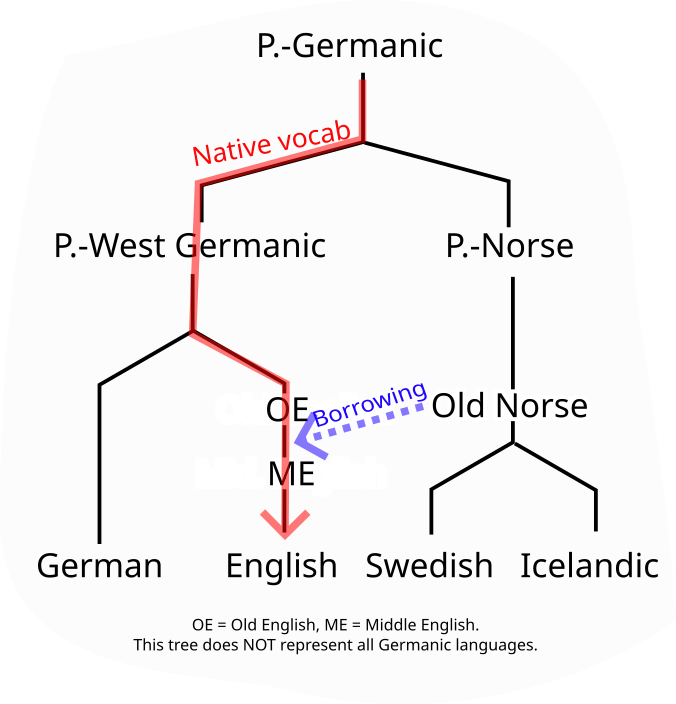When I was a child, I spoke like a child. Now I am a man and I speak like the King of England!
English is three different languages in a trench coat. It’s all borrowed to some degree.
Find a cool or useful website on the internet. Share it here so others Lemmings can bookmark it too.
When I was a child, I spoke like a child. Now I am a man and I speak like the King of England!
English is three different languages in a trench coat. It’s all borrowed to some degree.
Most linguists formally classify English as Germanic (West Germanic, alongside Frisian, Dutch and German, though one Norwegian linguist made a case for it being North Germanic), though some people refer to it as a Romance-Germanic creole. It is quantifiably true that, if you want to read Old English, knowing Icelandic will be more helpful than knowing modern English.
And that as a native English speaker, my English improved by studying Latin.
Three languages?
Not sure what the third one is. You could make an honest argument for a number of languages to be number 3.
I don't think it is literal 3, just a play on 3 X in a trench coach. I think I always see the meme as 3 of something but I am not sure.
If you're going to make these extremely complicated jokes, maybe you should explain the joke as well just in case an idiot like me comes along lol
I am not the original commenter, I am just sharing my interpretation
So you're saying it's a conspiracy?

But there are heaps of borrowed words in that text? "Friendly" stems from old germanic, so does "land"... how is there no etymologist checking for "foreign" words? Oh wait, english is but a mix of bad french and bad german... But still. I expected a bit more effort to replace "foreign" words...
English is a Germanic language, so Germanic words are fine, foreign just means latin, greek, french...
so Germanic words are fine
Not all Germanic words; it depends on how they found their way into the vocabulary. For example something like "sky" should be still removed, even if Germanic - because it's an Old Norse borrowing.
Old Norse evolved from Proto-Norse, which was a Proto-Germanic dialect. It's still Germanic.
That is correct but it does not contradict anything that I said.
Even if Old Norse is Germanic, Old Norse words in English are still borrowings. "Borrowed" does not mean "not Germanic", it means "not inherited", both things don't necessarily match.
This is easier to explain with a simple tree:

Only words going through that red line are "inherited". The rest is all borrowing, the image shows it for Old Norse words but it also applies to French (even if French is related to English - both are Indo-European) or Japanese (unrelated) or Basque (also unrelated) etc. words.
But I digress. In Anglish borrowings from other Germanic languages should still get the chop, as seen here and here.
From a quick glance The Anglish Times does a good job not using those borrowings. The major exception would be "they", but it's rather complicated since the native "hīe" became obsolete, and if you follow the sound changes from Old English to modern English it would've become "she", identical to the feminine singular. (Perhaps capitalise it German style? The conjugation would still be different.)
"Friendly" and "land" are inherited, not borrowed. Those are two different processes and Anglish only gets rid of the words from one, not from the other.
"English" is not a mix; "English vocabulary" is. (Just like the vocab of most other languages.) A language is not just its vocab just like a mammal is not just its fur. The core of the language (its grammar) is pretty much what you expect from a Germanic language after some aggressive erosion of the case system.
English didn't get many words from "German"; the inherited vocab is from "Proto-Germanic". The name might be similar but they're different languages, Proto-Germanic is the parent of English, German, Swedish, Icelandic, Gothic, etc.
People often point out the "French" (actually a mix of French and Norman) loanwords in English. Sure, there's a lot of them, but as Anglish shows they aren't structurally that important. On the other hand, the text couldn't get rid of "they", even if it's a borrowing from Old Norse - the old third person plural "hīe" would probably have ended as "she", just like the feminine singular.
EDIT: if the downvotes are due to some incorrect piece of info, please, say it. I tried to make the comment as accurate as possible, but something might've slipped, dunno.
Alternatively, if something that I said is unclear, please also say it and I'll do my best to clarify it.
I for one, thank you a lot for your clarification. I am a native german speaker and by no means a linguist - so I appreciate your effort to make some of these historical processes clearer. I was just a bit disappointed becuase I expected something else... there is a german book by Ze do Rock (a native brasilian for that matter) who tries to invent "Siegfridisch" a language that gets rid of all "foreign" words. No more "street (strasse)" for that is from latin, instead he uses "way (weg)" which is germanic. Also, the german wort "schreiben" stems from latin "scribere" and has to be replaced with the english "write" (ritzen) since that is what the celts did... and I was hoping this newspaper would do something similar :-)
Originally Anglish was a lot like Siegfridisch - a single guy (Paul Jennings), replacing borrowings with new expressions coined from native words, just for fun. Jennings framed this as how English would be if the Normans were defeated in 1066, and he published it in a satirical magazine (Punch).
It does look more serious nowadays, though. Anglish started out in 1966, and the people picking the idea up focused a lot on making it more consistent. (And also because Jennings wasn't being as playful as Zé do Rock.)
Kind of off-topic, but can you believe that practically nobody knows Zé do Rock here in Brazil? Even if a chunk of his stuff is written also in Portuguese. (He also plays with the language, his "brazileis" is... weird, but in a good way, to say the least.)
Wow. Thank you again for your detailed answer. I might have a look into Mr. Jennings and the Punch magazine. Hats off to Zé and to you for sharing your love for language(s) and teaching me a fair bit about that :-) Cheers!
That's an interesting experiment. I like how it "vibes" from informal to ancient.
And uh, why is this necessary?
It's kind of neat
If they did one in Klingon, if be interested.
And uh, why is this necessary?
It'd be kind of neat
If they did one in Anglish, if be interested.
I believe they did
Holy shit